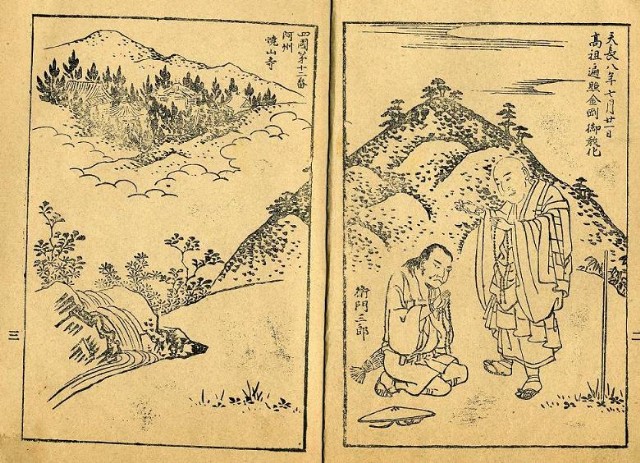Monk's Face Reflected In Moving Waters Poem by Saiom Shriver
Monk's Face Reflected In Moving Waters
One cannot save his face
seen in the river reflected
nor his visage by light
onto mirrors projected.
Therefore the monk Kobo-Daishi
before leaving on a journey
from which he might not
return, as a gift to his
parents, drew his unmoving
face seen in the moving waters.

Monday, December 7, 2015
Topic(s) of this poem: buddha,spirituality,walking
POET'S NOTES ABOUT THE POEM
Note: 'Kobo Daishi, who brought a populist form of Buddhism to Japan from China in the 9th century. For hundreds of years, a 750-mile pilgrimage route has circled this mountainous island, connecting 88 separate temples and shrines that claim connection to Daishi, also known as the Great Master. Each leg of the journey represents a stage of the path to nirvana: awakening, austerity and discipline, enlightenment, and nirvana.' The quote is from the link below.
Bruce Feiler's 'Sacred Journeys' on PBS focuses on 6 sacred events or places which drawn pilgrims. They are Lourdes, Jerusalem, the Kumbha Mela, Osun Osogbo, the Hajj, and Shikoku, which focuses on those who visit the 88 temples which Kobo-Daishi visited. Hundreds of thousands have repeated this pilgrimage through the years. One man has done completed 142 pilgrimates of 750 miles each. The first 20 of the 142 wered one by car, but the subsequent 122 were walked, a total of 106,500 miles of which 91,500 were walked. Bruce Feiler himself did not have an easy pilgrimage, because of a leg injury. Others have experienced walking up mountains in cold rain which turns the ground to mud, hunger, blisters, and numberless other discomforts. Many Japanese have been kind to the pilgrims, offering them food or drinks along the way, sometimes even cash. Pilgrims along the journey leave notes of encouragement, poems, and other mementos for those who follow. Many find that the outer journey leads to an inner one, and that the goal of completing the pilgrimage sometimes falls away into the eternal now.
Kobo-Daishi loved all beings, including animals and plants.
http: //www.pbs.org/wgbh/sacredjourneys/content/shikoku/
/> Biography of Kobo-Daishi
http: //www.davidmoreton.com/echoes/daishi.html
http: //davidmoreton.com/images/EmonSaburo_KoboDaishi_pic_T13.jpg
Bruce Feiler's 'Sacred Journeys' on PBS focuses on 6 sacred events or places which drawn pilgrims. They are Lourdes, Jerusalem, the Kumbha Mela, Osun Osogbo, the Hajj, and Shikoku, which focuses on those who visit the 88 temples which Kobo-Daishi visited. Hundreds of thousands have repeated this pilgrimage through the years. One man has done completed 142 pilgrimates of 750 miles each. The first 20 of the 142 wered one by car, but the subsequent 122 were walked, a total of 106,500 miles of which 91,500 were walked. Bruce Feiler himself did not have an easy pilgrimage, because of a leg injury. Others have experienced walking up mountains in cold rain which turns the ground to mud, hunger, blisters, and numberless other discomforts. Many Japanese have been kind to the pilgrims, offering them food or drinks along the way, sometimes even cash. Pilgrims along the journey leave notes of encouragement, poems, and other mementos for those who follow. Many find that the outer journey leads to an inner one, and that the goal of completing the pilgrimage sometimes falls away into the eternal now.
Kobo-Daishi loved all beings, including animals and plants.
http: //www.pbs.org/wgbh/sacredjourneys/content/shikoku/
/> Biography of Kobo-Daishi
http: //www.davidmoreton.com/echoes/daishi.html
http: //davidmoreton.com/images/EmonSaburo_KoboDaishi_pic_T13.jpg
READ THIS POEM IN OTHER LANGUAGES
This poem has not been translated into any other language yet.
I would like to translate this poem